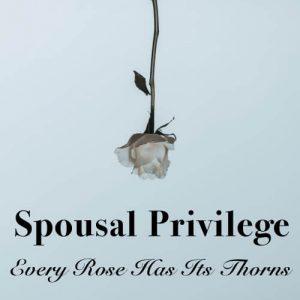
Between spouses, there is a marital privilege that prevents someone from testifying against their spouse in certain situations. This is thanks to the Federal Rules of Evidence (FRE) and most states’ laws. These rules don’t mean that your spouse’s attorney can object to every question you might be asked, but they do offer some protection. Understanding these marital privileges and when they apply can be an important component of a personal injury claim.
In federal court, FRE 501 says that common law governs the issue of privilege. In Trammel v. United States (1980), the United States Supreme Court ruled that “marital privilege” embodies two distinct concepts. Testimonial privilege and a confidential communications privilege are mirrored by state evidentiary laws. But what’s the difference between these two concepts?
Spousal Witness Privilege
Can you be forced to testify against your spouse? This is what most people think of when they hear “spousal privilege.” However, it is the narrower of the two parts of marital privilege. In general, you do not have to testify against your spouse if they violated the law and face criminal consequences.
Under this privilege, a person cannot be forced to testify against his or her spouse in a criminal proceeding. This privilege applies to testimony about events that happened during the marriage, as well as events before the two were married if they are married during the trial. If the spouses divorce, neither can claim the privilege and could be forced to testify.
When Is There no Privilege?
It is important, however, to understand that only the spouse testifying holds this privilege. If a husband or wife wants to waive this privilege, testifying against their spouse will be allowed, and the other spouse will not be able to prevent the testimony.
This means that a spouse who wishes to testify against their husband or wife in criminal court can do so. This may occur when the crime is so unspeakable that they do not feel they can forgive or accept what their loved one has done.
With small differences between states, the law for the most part recognizes that neither spouse can claim the testimonial privilege under some circumstances. This applies to a case involving their children or a criminal proceeding by one against the other, such as a domestic abuse case.
Spousal Communications Privilege
The second part of marital privilege is much broader in what it protects. Under both state and federal law, this privilege will prevent either spouse from testifying about marital communications between them. It applies in civil and criminal cases, and either spouse can claim the privilege, even after divorce or the death of the other spouse.
This means that a husband can prevent his wife from testifying even if she wants to take the stand and vice versa. This allows partners to keep their private communications private and not have to share them with the court or, in some cases, a much broader audience.
Proving Marital Communications
Although this privilege is broad, the parties still have to prove that a “marital communication” between the spouses is involved, instead of something one spouse simply witnessed the other do. Witnessing nefarious actions is not covered by the privilege.
Similarly, the parties also have to prove that the communication occurred in private. Courts have found that the privilege can be waived even by children simply being within earshot. For example, if one spouse confessed to drinking and driving before a fatal traffic accident they caused, this might be protected communication.
However, if the conversation occurred in a crowded restaurant or in the same room as their young children, it might be more difficult to prove the necessity of protecting “private” communication.
For a free legal consultation, call 800-537-8185
What If You Want to Keep Those Chats Private?
Spouses who want to avoid testifying about marital communications will also have to prove that they did not waive the marital privilege. A husband or wife can waive the privilege by talking about a private conversation with someone else after the fact, such as telling a friend. If your spouse discusses the details of a civil or criminal matter with you in confidence, you could risk your spousal privilege by discussing them with someone else.
This can also occur by placing the marriage at issue in a court case. For example, courts often find that the communication privilege is waived when one spouse is claiming loss of consortium due to the other spouse’s injury. The reasoning is that if the spouse is going to claim the marriage suffered as a result of the accident and injuries, the other party should be able to inquire into those facts.
Also, like the testimonial privilege, there are also cases where this privilege cannot be invoked, such as a civil lawsuit by one spouse against another or a case involving their children. The courts will always generally rule on behalf of children in criminal and civil cases since they cannot speak for themselves. The best option for them usually is letting the truth be heard in most cases.
Do You Have Concerns About Spousal Privilege in Your Civil Case?
If you’ve been injured in an accident, contact us for a free case evaluation. You be eligible to file a claim for:
- Medical costs
- Income losses
- Emotional distress
- Further damages
Your spouse may also have a claim for loss of consortium if your injuries harmed your spousal relationship.
We work on a contingency-fee-basis. We also provide complimentary case assessments. We can also discuss how to protect your private conversations and whether your partner may qualify for spousal privilege if the case goes to trial.
In many cases, our attorneys can prove a case and recover compensation for a client without needing to file a lawsuit or make court appearances. Instead, we negotiate a fair settlement agreement with the at-fault party’s insurer. This eliminates any worries about spousal privilege and your rights because we never need to involve a judge or jury and formal testimony.
Click to contact our personal injury lawyers today
Speak with a Lawyer from Morris Bart, LLC Today for Free
An auto accident attorney at Morris Bart will assist you in the case evaluation process. Initial consultations are free for injured accident victims and their families. We represent clients hurt in a wide range of personal injury incidents. We have 15 office locations throughout Louisiana, Mississippi, Alabama, and Arkansas.
Call us to get started on your case today.
Questions?Call 800-537-8185
to find a Morris Bart office near you.





